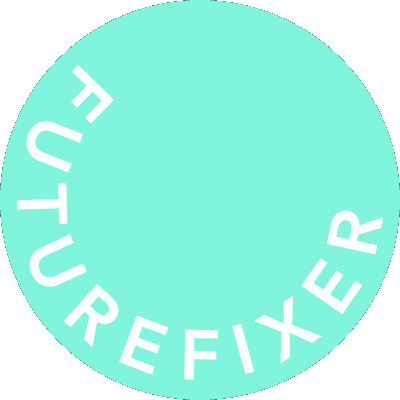 “I have a deep desire to make Africa a better place.”
“I have a deep desire to make Africa a better place.”
From its volcanoes to its tropical rainforests, Cameroon is one of the most biodiverse countries in Africa. Often considered the ‘second lungs of the earth’, the Congo Basin boasts a beautiful coastline, mountains, savanna, desert and tropical rainforests – and endangered species like bonobos, forest elephants, turtles and manatees.
But climate change and the rise of ocean pollution is affecting livelihoods more and more. That’s why recycling revolutionary Ismaël Essome Ebone (speaker at Fixing the Future 2022) has designed a sustainable development approach that this biodiversity-richness deserves.
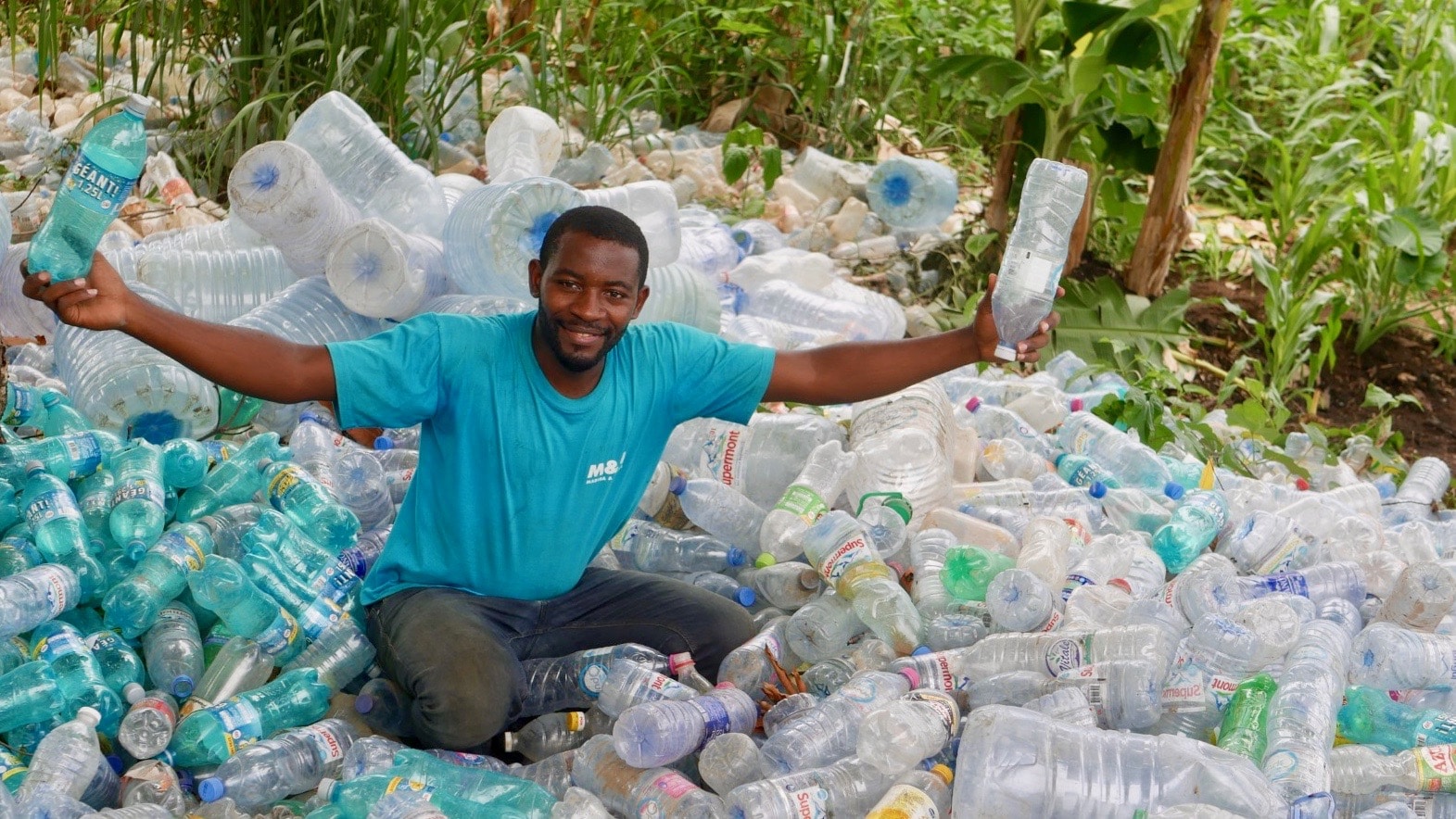
Recycling is a new sector in Cameroon
The award-winning entrepreneur started by designing an ecological canoe made of plastic bottle waste that helps fishing communities and aids ecotourism. But he didn’t stop there. Find out why fishermen laughed when Ismaël first ventured out in the ‘ecoboat’ – and how his sustainable designs are solving an ocean of problems.

Ismaël on seeing plastic as an invasive species, cleaning up Cameroon & wanting to be Africa’s answer to Aquaman
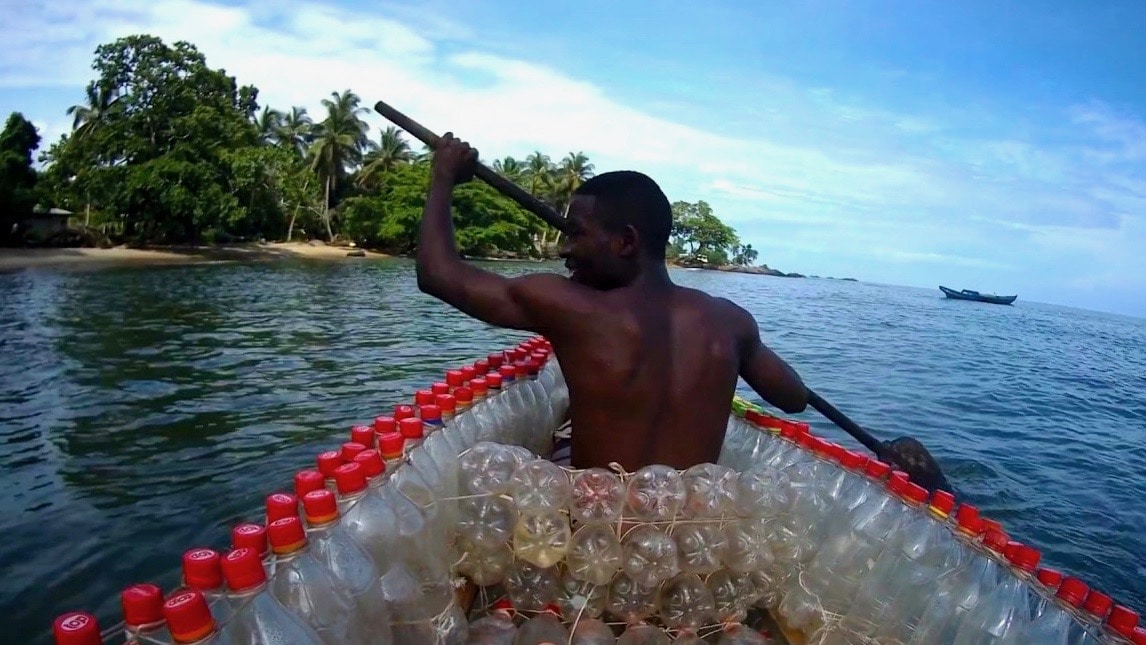
The ecoboat moves like a caterpillar
We are Sawa: that means ‘the people of the water’. My dad is a fisherman and his dad before him. I learnt to fish when I was a child, but as I grew up I saw fishing decline as a profession.
When I was 12, we used banana plants and rope to make surfboards. So even though I’m an engineer with knowledge of building aquatic sculptures like canoes and boats, the inspiration for the ecoboat came from my childhood toys.
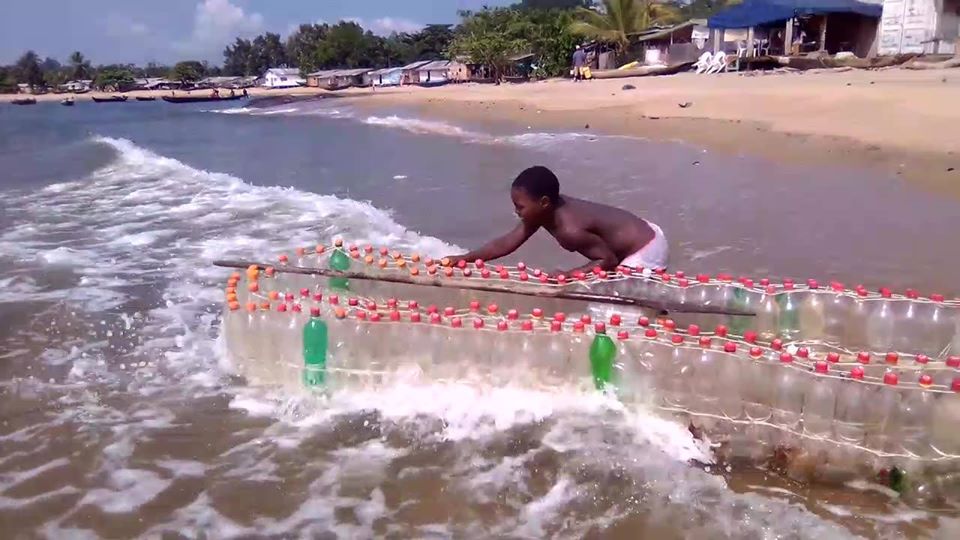
This is no toy
In the village where I grew up, rich people abuse villagers by taking their farms using force and power. My father is a hardworking and brave man. His aim is to ensure the wellbeing of his family and do his best to defend poor people. He inspired me to do my best to provide help and support people wherever I am – particularly within my community.
I have chosen to be the one fisherman that people in need can rely on. Nearly 250,000 people in Cameroon directly depend on fishing. There’s no serious national programme to help local communities to build a strong resilience to climate change.
The effects of climate change in Cameroon are many and diverse. Ocean acidification is very present on the Atlantic coast. We fear for marine biodiversity and the extinction of vulnerable and endangered species. The disruption of the rhythm of the seasons also has a direct disruptive effect on agriculture, impacting African catfish and common carp. Indigenous people are already being forced to migrate to the city, abandoning their unproductive fields to seek refuge.

Many people seek a better life in Europe
Plastic has become an invasive species and is the scourge of the 21st century. Plastic takes between 400 to 1,000 years to degrade, affecting biodiversity, soil and humans. According to scientists, there will be more plastic in the oceans than fish.
It’s essential to protect the legacy of nature. People rely on what nature provides to live. We need serious action to create resilience. Unfortunately many fishermen and farmers have never been educated, so don’t realise what’s happening to them. Doing nothing to help would be a great loss for humanity.
I have a deep desire to make Cameroon and Africa a better place… helping my country fight pollution, to create an awakening of consciousness and resilience in the face of the climate emergency, while creating jobs and promoting the green economy. My beloved wife and I are very concerned about the future as we are planning to have children.
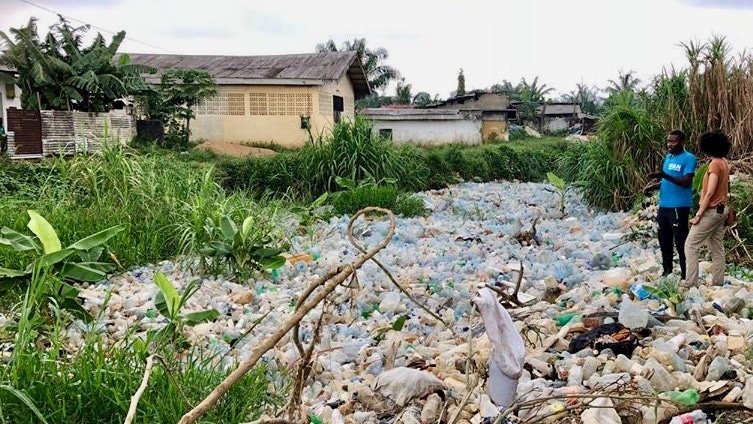
Plastic rivers litter neighbourhoods
I first decided to become an engineer after being shocked at how the economic city of Douala was crumbling under plastic waste. One day I was taking shelter to avoid the rain and saw how plastic bottles flooded streets in my neighbourhood. It seemed obvious that public authorities and private organisations were not trying to solve this problem. I switched my studies to go to an environmental management engineering university.
I worked with the Zoological Society of London in biodiversity conservation for two years. I was shocked to see all the organisations working for the protection of the environment in Cameroon were foreign, so resigned and founded the nonprofit Madiba&Nature to help preserve the livelihoods of fishermen and address the issue of marine plastic pollution.
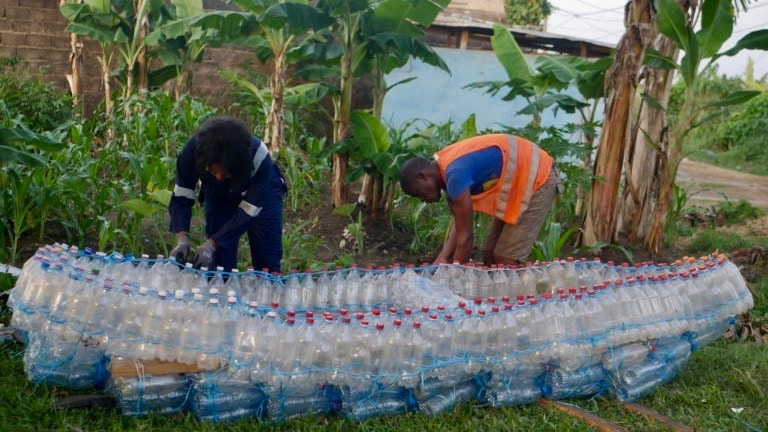
It’s essential to protect nature
‘Ecoboats’ are easy to make. In 2015 I decided to collect plastic bottles on the beaches, rivers and in the city. Hundreds of students, women and local residents joined the weekly beach cleanup program. We started by gathering 1,000 plastic bottles collected from the drains of Douala.
The fishermen laughed at the first sight of the ecoboat. They said “they are only bottles” and called it a “toy”! They never thought for a moment that this would work.
Now 40 boats are available for trips on the beach. They are used for ecotourism by more than 100 fishermen. Plus, we have seven team members and over 30 volunteers. A collaboration with local fishing organisations makes it possible to generate income for members of Londji Fishermen’s Association, who benefit from capacity building training in tourism and work as tourist guides.

A wooden boat would have tipped, but not Ismaël’s raft of bottles
The ‘ecobin’ is a new design to promote recycling of plastic waste. It can fit up to 1,000 more plastic bottles. With 100 ecobins we can collect between 3 to 5 tonnes of plastic bottles each month. That allows us to build 46 more ecoboats for fishing and ecotourism and create 10 jobs within the Londji community.
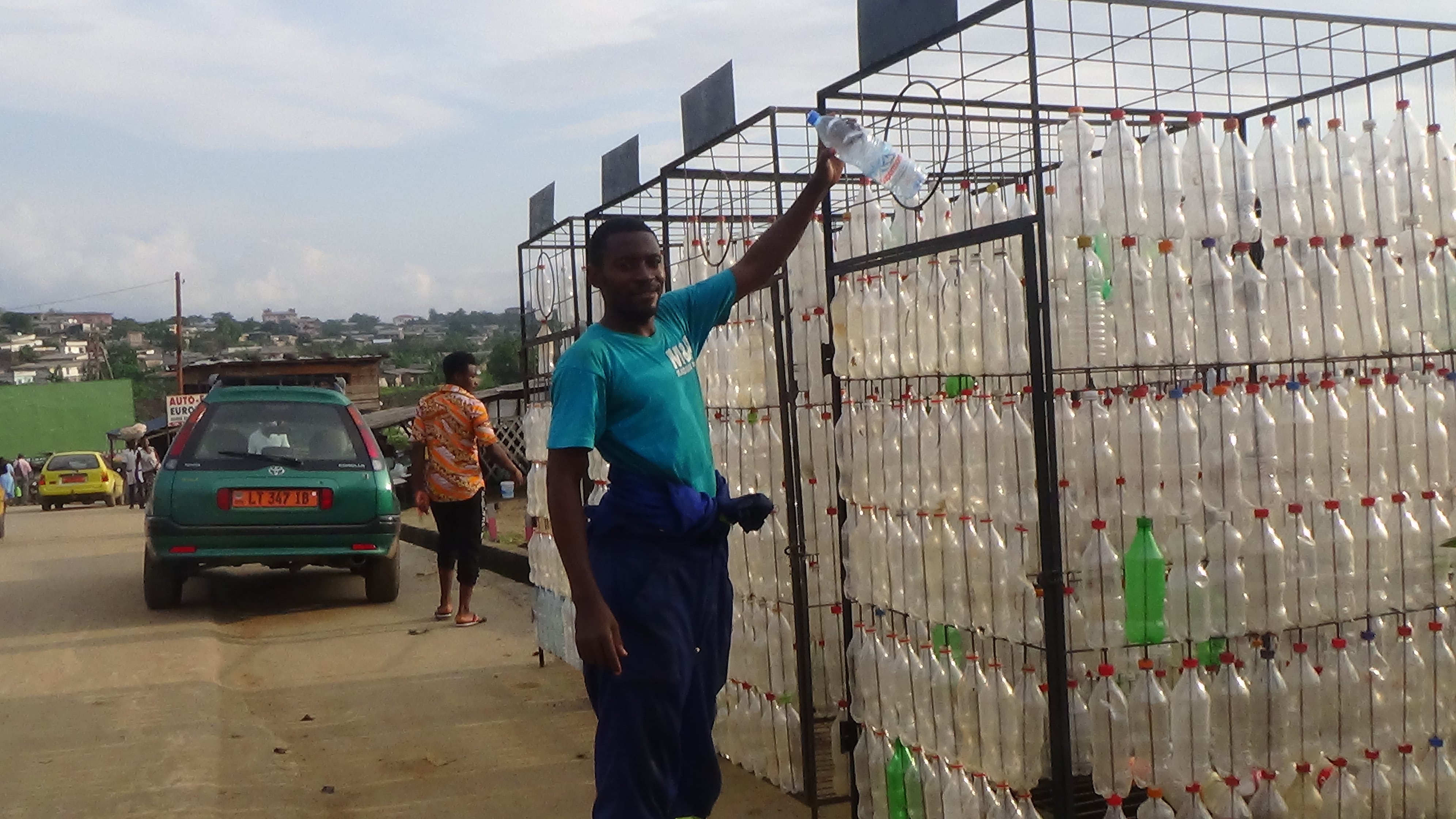
Ecobins made of bottles in which to collect even more bottles
I want to help young people seize opportunities in green business. Now hundreds of people are surviving by collecting and selling waste, and recycling plastic bottles into ecobins help make cities cleaner. Next we want to install this innovative system of waste management on beaches.
Recycling is a new sector in Cameroon. It’s hard to educate people to respect the rules because there are no serious civil engagement programs in school, so people don’t really care about selecting and sorting their waste at home. Due to the insufficient amount of bins in the streets and the lack of a recycling system, people aren’t used to good habits when it comes to waste management.
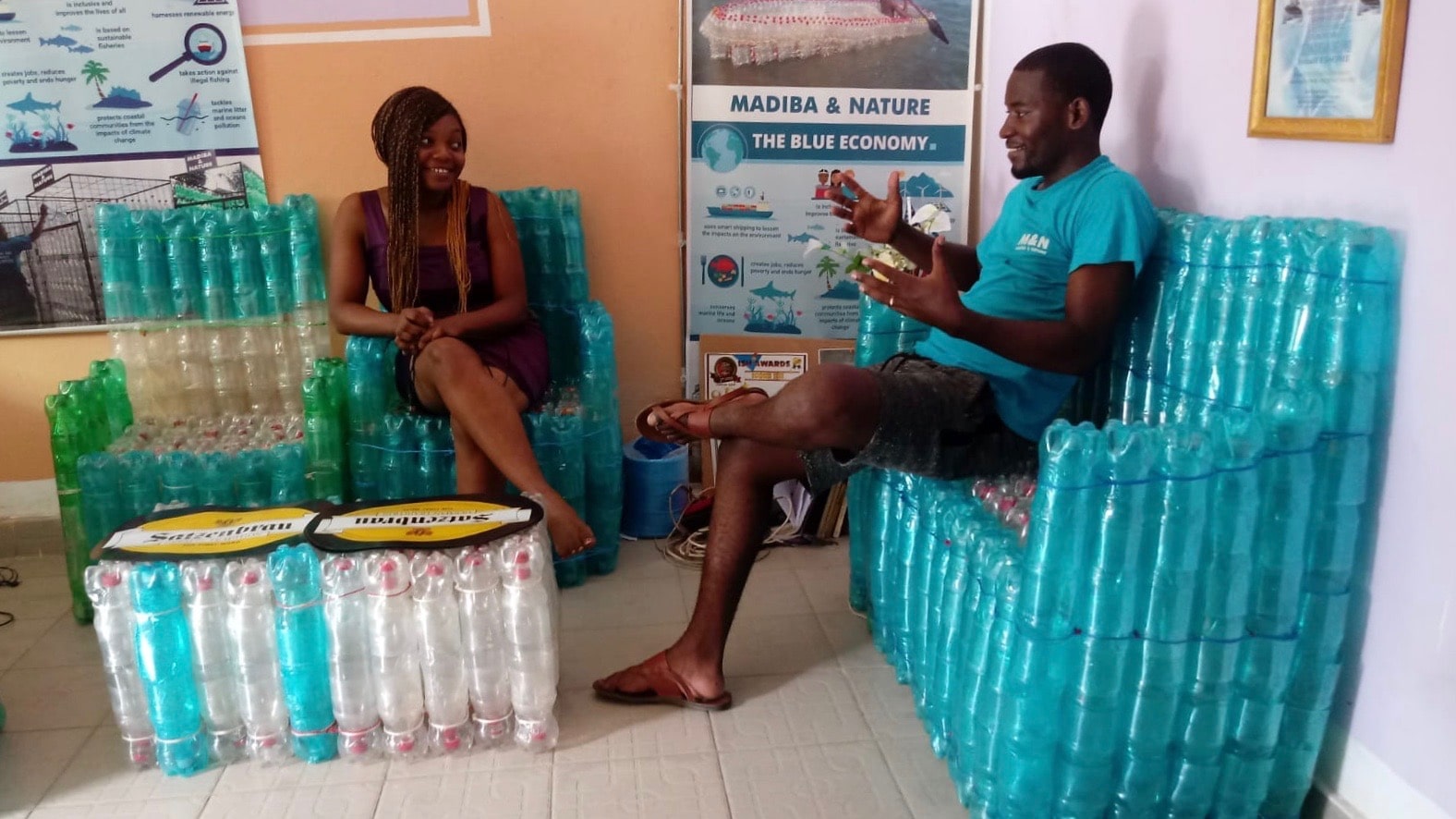
Planning green business and a blue economy
Many young people I know emigrate to seek a better life in Europe illegally. Or they become homeless and jobless in the cities of Douala and Yaoundé. This pushed me to develop strategies for sharing experiences through seminars, coaching and training.
These new ecological bins have enabled us to raise awareness. We have created a module of environmental education in 15 schools and two universities in Cameroon, reaching more than 35,000 people. We teach nature conservation, wildlife studies, geography and practical recycling and upcycling workshops. Training can be done digitally as e-learning too.
The ‘circular economy’ idea works here. Circular economy consists of creating wealth through recycling of waste and its commercialisation, so it generates income for the poor, but also creates jobs and boosts green entrepreneurship. Promoting this alternative way of doing business was a practical way to encourage communities to preserve the environment because it was good for them.
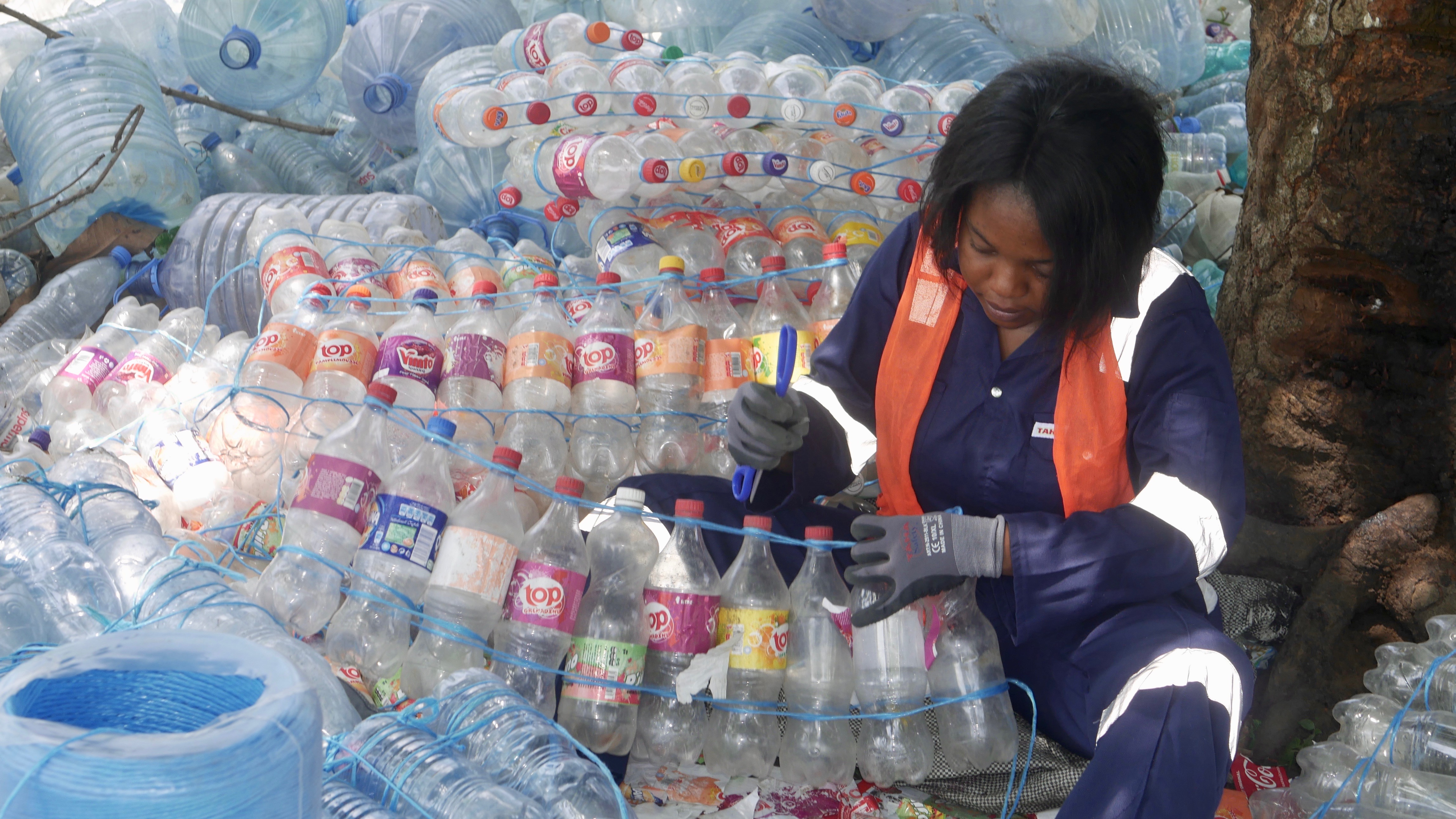
Making is ecoboats simple and sustainable
My FutureFixers are… scientists, innovators and engineers who work day by day to look for solutions that will help humanity to tackle climate change issues and create a resilient world for everyone. My dream is to expand throughout the country and other African countries in need.
In times of COVID19… almost all tourist activities on the beaches are reduced because people no longer travel. This has reduced our revenues in this area to zero.
During these periods of containment we have also observed an increase in the consumption of bottled juice and drinking water. That means more pollution in neighbourhoods. The best we can do is to provide our ecobins in buildings, households and across the city to facilitate free waste removal and recycling.
My three tips to help the planet... Limit the use of single use plastics, support education for all in countries in need and protect biodiversity or support nature conservation efforts. Everyone should think twice before continuing to contribute to the amount of plastic that is released into nature and goes into the oceans.
If I could have any ‘FuturePower’… I would be a kind of Aquaman, a protector of the oceans.

“Thank you!”
AtlasAction: ► Donate here to help the conservation of nature and promotion of circular economy in Africa – and come along and hear Ismael at ‘Fixing the future’ in Barcelona.

